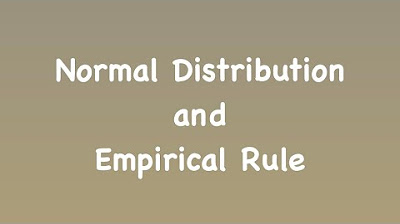Standard Deviation - Explained and Visualized
Summary
TLDRThis video script delves into the significance of standard deviation in statistical analysis, illustrating its role in determining data's normal distribution and identifying outliers. It explains how standard deviation measures data spread, with a low value indicating close clustering around the mean and a high value suggesting a wide dispersion. The '68-95-99.7 rule' is highlighted, showing the percentage of data points within one to three standard deviations of the mean. The script uses examples like LeBron James and Yao Ming's heights to demonstrate the practical application of standard deviation in real-world scenarios, and it also touches on its importance in particle physics for identifying significant discoveries.
Takeaways
- 🔍 Standard deviation is a measure of the amount of variation or dispersion in a set of values.
- 📏 A low standard deviation indicates that the data points are closely clustered around the mean, while a high standard deviation suggests a wider spread.
- ⚖️ Standard deviation is particularly useful when the data follows a normal distribution, forming a bell curve.
- 📊 The concept of standard deviation helps to determine if a data point is typical or an outlier.
- 📉 The number of standard deviations a data point is from the mean can indicate how unusual or expected it is.
- 🔢 The 68-95-99.7 rule states that about 68% of data fall within one standard deviation of the mean, 95% within two, and 99.7% within three.
- 🤸♂️ For American adult males, with an average height of 5'10" and a standard deviation of 3 inches, 68% are within 5'7" to 6'1", 95% within 5'4" to 6'2", and 99.7% within 5'1" to 6'3".
- 🏆 LeBron James and Yao Ming are extreme outliers in height, with LeBron being 1 in 2,500 and Yao Ming being 1 in 450 million.
- 🧪 In particle physics, a 5 Sigma result, which is five standard deviations from the mean, is considered significant and could indicate a new discovery.
- 📈 Standard deviation, along with the mean, is crucial for understanding statistical significance and expected variations in data.
Q & A
What does the concept of standard deviation measure in a set of data?
-Standard deviation measures the spread or dispersion of a set of data, indicating how much the data varies from the average or mean.
What is the significance of a low standard deviation in a dataset?
-A low standard deviation signifies that the data points are closely clustered around the mean, indicating less variability within the dataset.
How does a high standard deviation differ from a low one?
-A high standard deviation indicates that the data points are dispersed over a wider range of values, showing more variability compared to a dataset with a low standard deviation.
What does the 68-95-99.7 rule relate to in terms of standard deviation?
-The 68-95-99.7 rule states that approximately 68% of the data fall within one standard deviation of the mean, about 95% within two standard deviations, and about 99.7% within three standard deviations.
What is the average height of an American adult male according to the script?
-The average height of an American adult male is 5'10" (70 inches).
How does the script use the 68-95-99.7 rule to determine the percentage of American men taller or shorter than the average height?
-Using the 68-95-99.7 rule, the script calculates that 68% of American men are within 3 inches of 5'10", 95% within 6 inches, and 99.7% within 9 inches of the average height.
What does the script suggest about the rarity of individuals like LeBron James and Yao Ming in terms of height?
-The script suggests that LeBron James is approximately 1 in 2,500 and Yao Ming is 1 in 450 million in terms of height rarity, based on their heights being significantly above the average.
In particle physics, what does a '5 Sigma' result signify?
-A '5 Sigma' result in particle physics signifies a discovery, as it represents a result that is five standard deviations above or below the mean, with only a 1 in 3.5 million chance of being due to random fluctuation.
How does standard deviation help in determining statistical significance in data?
-Standard deviation helps in determining statistical significance by allowing us to assess whether a data point is part of expected variation or significantly different from the mean, thus indicating whether it is an unusual or an expected outcome.
What is the role of standard deviation in understanding data distribution?
-Standard deviation plays a crucial role in understanding data distribution by providing a measure of how spread out the data is, which is essential for determining the normality and variability of the data.
Outlines

This section is available to paid users only. Please upgrade to access this part.
Upgrade NowMindmap

This section is available to paid users only. Please upgrade to access this part.
Upgrade NowKeywords

This section is available to paid users only. Please upgrade to access this part.
Upgrade NowHighlights

This section is available to paid users only. Please upgrade to access this part.
Upgrade NowTranscripts

This section is available to paid users only. Please upgrade to access this part.
Upgrade NowBrowse More Related Video
5.0 / 5 (0 votes)





